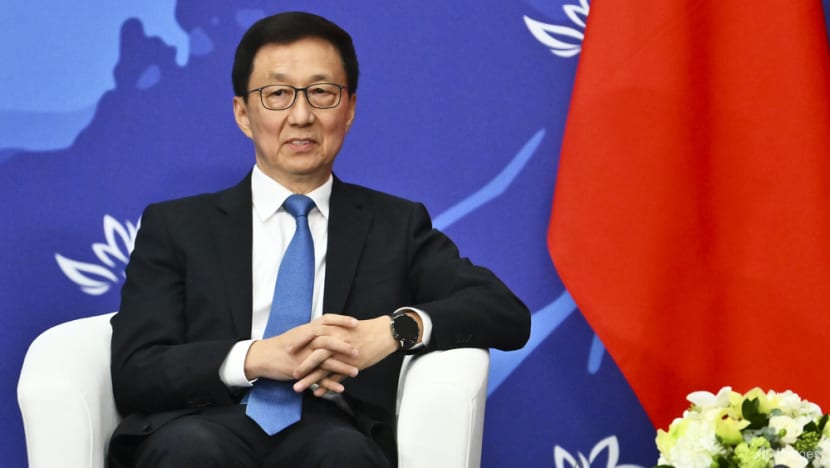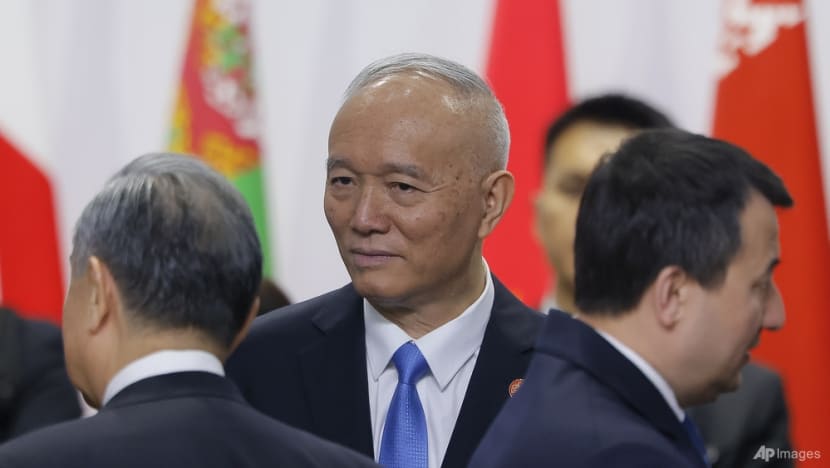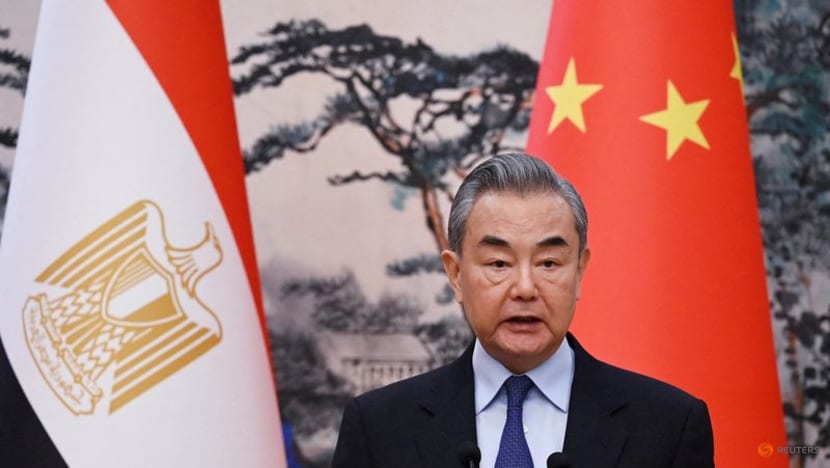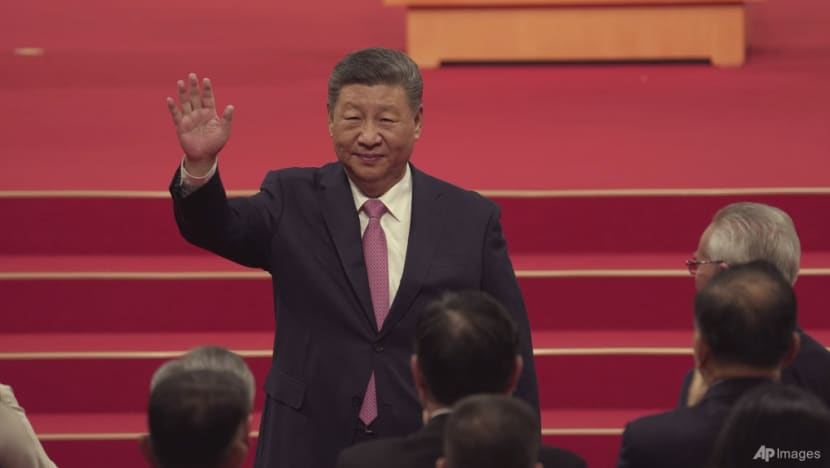SINGAPORE: China is “breaking precedent” by sending Vice President Han Zheng to Donald Trump’s upcoming inauguration, making him the most senior leader in Chinese history to attend the event.
Analysts say he is a “safe choice”, senior enough to “show face” even though Trump’s invite was extended to President Xi Jinping who, as expected, will be absent.
Political watchers also note that it is rare for heads of state to attend US presidential inaugurations, largely considered domestic events.
“We haven’t had a senior Chinese envoy come to any of the inauguration,” Dennis Wilder, a former White House China adviser currently a professor at Georgetown University, told CNA, adding that it has “always been Chinese ambassadors” representing the country.
He adds: “We are breaking precedent with this. In that sense, it’s quite interesting.”
SENIOR ENOUGH BUT NOT PART OF XI’S INNER CIRCLE
Born in Shanghai in 1954, the 70-year-old Han has served as China’s vice president since 2023.
He stood as the seventh-ranking member of China’s powerful Politburo Standing Committee between 2017 and 2022 and previously held top-ranking positions like China’s vice premier and Communist Party chief of Shanghai.
He will travel with a high-level envoy from Beijing to witness Trump’s swearing in on Monday (Jan 20).
He’s considered familiar and capable enough to handle complex Sino-US conversations, but also not too close to President Xi’s personal network that a protocol miscue would tarnish the party’s prestige.
Han fits the bill and is a “safer choice,” says Hoo Tiang Boon, an associate professor at Nanyang Technological University’s (NTU) School of Social Sciences.

“He is not somebody seen as being part of Xi’s inner circle at the present moment… and certainly not somebody viewed as a threat by Xi, that’s why he (holds) that particular position.”
It’s a “middle ground move” on Beijing’s part, Hoo adds – one that both addresses US “expectations” of receiving a “senior-level” figure from China for Trump’s big day, and at the same time “doesn’t give the Americans exactly what they want”.
“If things don’t turn out (well)… that’s fine because he’s the vice president, not somebody with any significant influence,” Hoo said.
“Sometimes, when Xi’s confidants have been used for high-level positions and missions, they have been targeted by foreign powers in order to embarrass Xi personally,” said Josef Gregory Mahoney, a professor of politics at East China Normal University.
He also pointed to the likelihood of anti-China executive orders following Trump’s inauguration ceremony.
“It’s most likely a thankless mission, much less an opportunity to create goodwill,” Mahoney said of the upcoming inauguration.
“(It’s) best to send someone who can show enough face but not risk losing too much face if bad things follow from the Trump side.”
During Trump’s first term, Han remained vocal in conveying Beijing’s response to harsh tariff proposals and trade disputes.
Wilder likened Han’s role to that of his predecessor, Wang Qishan, who served as vice president from 2018 to 2023, often attending overseas functions when President Xi did not.
“Han Zheng stands in (for Xi) at international meetings that he decides not to attend – this is the role that the Chinese vice president plays in the leadership,” Wilder said.
In China, the role of vice president is largely ceremonial and according to the constitution, “assists the president in his work” and also “exercises functions and powers the president may entrust to him”.
WHY NOT CAI QI OR WANG YI?
Before Han Zheng’s confirmation, two other names were floated as possible envoys: Cai Qi, a Politburo Standing Committee member, seen as Xi’s closest confidant among the current leadership, and China’s foreign minister Wang Yi, often seen representing Beijing at global events and forums.
As one of China’s most powerful officials sitting on the seven-man Politburo Standing Committee, Cai Qi also serves as President Xi’s chief of staff — the first person to hold both positions since Wang Dongxing, who served as Mao Zedong’s chief of staff.

From controlling access to President Xi’s office, to wielding significant influence over party doctrine and agenda-setting, Cai Qi, as Wilder described, “is extremely powerful”.
“He is the right-hand man. He runs both Xi Jinping’s personal office and his party office, which has not been done since the Mao era.”
“If Xi were to send Cai Qi, it would be taken as a signal that the Chinese value stability and good relations with the Trump administration,” Hoo said.
Sending him to Washington would be a far riskier choice for Beijing, one that some in Trump’s team might secretly hope for, analysts say.
Wilder told CNA that it would have sent an “enormous signal”, given that it was “quite clear that (Cai Qi) is Xi’s innermost confidant these days”.
Sending him to Washington, while an “extraordinary” move, would be “almost impossible” due to diplomatic and political risks, Wilder adds.
Even if Xi’s absence prevents a direct personal slight by the unpredictable Trump, Beijing must still brace for “things that President Trump tweeted or said that China considered humiliation,” Hoo said.
Cai’s personal closeness to Xi would mean that any fallout could reflect on the Chinese leader himself.
He recalled a meeting which took place between Trump and outgoing Canadian Prime Minister Justin Trudeau in Mar-a-Lago on Dec 1, that ended in a series of barbs and diplomatic confusion after they discussed border-related issues and potential tariffs.
President Xi and others in his inner circle view such events with caution and are aware that things with “Trump can change overnight”, Hoo said.

Well-versed in foreign policy with extensive experience handling testy Sino-US relations, many thought Chinese Foreign Minister Wang Yi would be the one making his way to Washington.
To Wilder, that would have been a “rather routine” decision as many other countries dispatch their foreign ministers to attend ceremonies of this nature.
“(Sending) Wang Yi would frankly be a step down… it would be nothing terribly unusual,” he adds.
Mahoney pointed out that “if either Cai Qi or Wang Yi are sent, there should be no complaints”, since both hold sufficiently high status and are recognised on the world stage.
But in his view, “Han Zheng is more than adequate in terms of rank” to handle this mission.
“(The) vice president is a strong, safe choice.”
“UNPRECEDENTED” FOR XI TO ATTEND
For those versed in Beijing’s diplomatic playbook, Xi was always highly unlikely to attend Trump’s presidential inauguration.
“It would be unprecedented for a leader of a major power like China (also a US rival), to actually intend to attend the inauguration,” said Hoo, adding that he had expected Xi to personally turn down the invite.

In the Chinese leader’s case, travel months are planned in advance – ensuring meticulously negotiated agendas, protocols and positive deliverables.
Mahoney highlighted contrasts between Chinese and US approaches.
“The Chinese have (traditionally) generally been very keen on (adhering to) protocol in diplomatic relations,” he said. “Trump is not.”
Xi has always kept a tight focus on controlling the optics of all his international appearances and even if he did accept the invitation, Trump’s team might not be able to ensure that diplomatic protocols are “adequately negotiated and managed” prior to inauguration day, Mahoney added.
From Beijing’s perspective, that would be a recipe for potential embarrassment and disaster.
“Trump can’t be trusted to stick to the script anyway,” Mahoney said, adding that Chinese leaders tend to avoid embarrassing situations and Trump “has a habit of embarrassing himself and others”.
Citing State Department records dating back to 1874, Wilder noted that “no foreign head of state has attended an American transfer-of-power ceremony”.
A diplomatic scenario as public as a US presidential inauguration, especially one orchestrated by Trump, also carries plenty of risks.
“They (Beijing) don’t know the Trump team. They don’t know these players. They don’t know what people would say in the immediate aftermath of (Trump) meetings with Xi,” Wilder said.
“From Beijing’s point of view, the danger in (Xi) accepting an invitation of this sort is greater than the potential payoff.”
WHO ELSE IS INVITED?
Han Zheng would be one of the most high-profile attendees in China’s political history, analysts said, which grants Beijing leverage to meet with Trump’s incoming administration, or at least gather intelligence on the ground in Washington.
“The Chinese are quite keen to have a sense of what Trump’s administration will do, and having access to senior members, or indeed Trump himself, in order to make a better gauge,” Hoo said.
But he won’t be the only prominent political figure in Washington for the inauguration ceremony.
Trump’s inauguration guest list has also expanded to include other world leaders and politicians, some controversial in their own right.
Notably, British politician Nigel Farage, known for championing Brexit and being a close Trump ally, said he would be there on Jan 20.
Argentina’s far-right president Javier Milei, often described as an ultra libertarian economist, is also expected to attend, according to Bloomberg.
Japanese Foreign Minister Takeshi Iwaya confirmed his attendance, telling broadcaster NHK that he was keen “to build a relationship of trust with the Trump administration securely”.
India and Australia also announced that their foreign ministers would attend the swearing-in session.
Trump has also reportedly invited Salvadoran President Nayib Bukele, Italian Prime Minister Giorgia Meloni, Hungarian Prime Minister Viktor Orbán, and former Brazilian President Jair Bolsonaro, though some are still deliberating.
Those left off the guest list include Ursula von der Leyen, president of the European Commission and French far-right leader Marine Le Pen and her protégé Jordan Bardella.
The tech world will also be well-represented, with billionaire CEOs Elon Musk, Jeff Bezos, and Mark Zuckerberg reportedly planning to attend.
TikTok CEO Shou Zi Chew, will notably make an appearance too, amid news of a looming ban that is set to come into effect the day before.
While Michelle Obama will skip the inauguration, her husband Barack Obama is expected to attend – along with former US president George W Bush and his wife Laura.
Collapse Expand
RESET OF SINO–US RELATIONS?
US-China ties in the Trump 2.0 era are projected to be rocky, with Trump threatening to slap tariffs as high as 60 per cent on imported Chinese goods, and his incoming cabinet consisting of notable China hawks, which include National Security Adviser pick Mike Waltz and defence chief pick Pete Hegseth.
US Senator Marco Rubio, Trump’s pick for Secretary of State, called China “the biggest threat to the US” and said it was the “most potent and dangerous near-peer adversary this nation has ever faced”.
But Trump himself has not said things about China that are “nearly as hawkish as his advisers”, Wilder noted, adding that Sino-US relations were going to be more “about his feelings” than his cabinet’s.
“We know that Trump, in the first administration and generally, is very much his own man and will make his own judgments.”
Even if the inauguration is largely ceremonial, Wilder believes Chinese officials still see value in face-to-face interactions with Trump and his incoming cabinet members.
While in Washington, Han may meet US officials on the sidelines to talk about policy issues – although any substantive discussions will be unlikely, experts say.
“The Chinese also want to send a signal that (they) do not want to be seen as being unnecessarily problematic or difficult,” Hoo said, adding that US officials could also see Han’s trip as a “fact-finding” session to get a better sense of the Chinese perspective.
“There could be a great deal of positive value in these interactions,” said Wilder.
Mahoney casted doubt on the likelihood of a genuine reset between Beijing and Washington, describing the invite to President Xi as “a rhetorical gesture Trump could exploit”.
Hoo meanwhile sees little chance of a thaw in relations between Beijing and Washington, let alone a hard reset.
“I certainly don’t think there’s any attempt to reset US-China relations for a very simple reason – given the kind of political climate right now in the US, it’s difficult for any US politician, and certainly any US leader, to try to reset the relationship (with China),” he said.
The fundamental goal of the US was to “retain primacy by whatever means possible”, he adds, a view he believes has proven consistent throughout both Biden’s administration and Trump’s incoming administration.
“In any case, I don’t think the Chinese and certainly Xi Jinping, are under any illusions that even if Xi himself personally attends the inauguration, will have any significant impact, at least in the short term, on changing the long term trajectory of US-China relations.”
